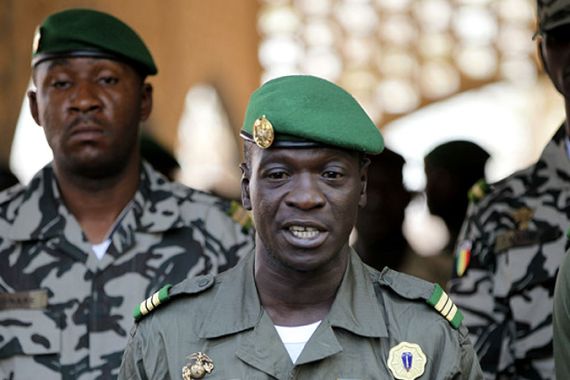Mali coup leader rejects ECOWAS terms
Coup leader rejects what he says are decisions made “without consultation” of civilian government.

The captain who led a coup in Mali last month before handing power back to a civilian president has rejected the decision by West African states to send troops, casting a shadow over delicately-balanced negotiations to resolve the country’s crisis.
“All the decisions announced in Abidjan were reached without consulting us,” Amadou Haya Sanogo told reporters on Saturday.
“I do not agree with the deployment of soldiers from the Economic Community of West Africa States”, or ECOWAS.
“No foreign soldier will step on Malian soil without being invited by the Malian government,” he added.
Sanogo also rejected an ECOWAS decision to set a 12-month transition until presidential and legislative elections.
The junta had already agreed to hand over power for 40 days to a civilian government led by caretaker president Dioncounda Traore, and then allow the country to hold elections by the end of May.
But the West African regional bloc ECOWAS on Thursday said the interim government should have up to 12 months to hold the elections.
“ECOWAS took its decisions unilaterally, which means they do not bind us,” said Sanogo. “The interim president will serve 40 days. It’s going to be up to us to choose the institutions that are going to continue this transition. That remains unchangeable…”
Armed soldiers gathered outside the talks at the Kati military base, about 20km (13 miles) north of the capital Bamako shouting “Down with ECOWAS”.
ECOWAS plan of action
Leaders from the 15-state regional bloc, gathered for an extraordinary summit on the crises in Mali and Guinea-Bissau, decided on Thursday to deploy a stabilisation force to both countries.
Ivory Coast President Alassane Ouattara, current head of ECOWAS, pledged a firm response to the instability “to prevent our sub-region from giving into terrorism and transnational criminality”.
Sanogo led a group of renegade soldiers who toppled Amadou Toumani Toure on March 22, shattering the landlocked country’s image as a democratic success story in the region.
Under diplomatic pressure from Mali’s partners and military pressure from an advancing rebellion in northern Mali, he agreed to hand power over to Traore, the former speaker, who was sworn in as president on April 12.
ECOWAS on Thursday urged the military to return to the barracks, amid allegations that the former junta still interferes with the country’s political life and that the return to constitutional rule is not complete.
Political leaders and diplomats in Mali also suspect the coup leaders may be reluctant to return to the barracks, and former colonial master France on Friday called on them to abide by signed agreements and give up control of public ORTM radio and television.